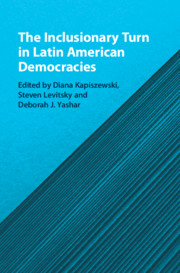Crossref Citations
This Book has been
cited by the following publications. This list is generated based on data provided by Crossref.
Ho, Carmen Jacqueline
Béland, Daniel
Bodruzic, Dragana
Shi, Shih-Jiunn
and
Nizar, Zainab
2022.
Social policies in democratic and authoritarian regimes: comparing the introduction and implementation of the National Rural Employment Guarantee in India and Dibao in China.
Journal of International and Comparative Social Policy,
Vol. 38,
Issue. 3,
p.
241.
Anria, Santiago
and
Bogliaccini, Juan
2022.
Empowering Inclusion? The Two Sides of Party-Society Linkages in Latin America.
Studies in Comparative International Development,
Vol. 57,
Issue. 3,
p.
410.
Palmer-Rubin, Brian
and
Collier, Ruth Berins
2022.
Work and Demand Making: Productionist and Consumptionist Politics in Latin America.
Comparative Political Studies,
Vol. 55,
Issue. 10,
p.
1631.
Ferre, Juan Cruz
2023.
Welfare regimes in twenty-first-century Latin America.
Journal of International and Comparative Social Policy,
Vol. 39,
Issue. 2,
p.
101.
Gallagher, Janice K.
Kruks-Wisner, Gabrielle
and
Taylor, Whitney K.
2024.
Claim-Making in Comparative Perspective.
Barrientos, Armando
2024.
The Politics of Welfare in the Global South.
p.
246.
Alves, Daniel H.
2024.
Partisanship, Cross-Party Coalitions, and Social Policymaking in Brazil.
Latin American Research Review,
Vol. 59,
Issue. 3,
p.
570.
Sarsfield, Rodolfo
Moncagatta, Paolo
and
Roberts, Kenneth M.
2024.
Introduction: The New Polarization in Latin America.
Latin American Politics and Society,
Vol. 66,
Issue. 2,
p.
1.
Barreto, Amílcar Antonio
and
Maldonado, Diego
2024.
Race and populism on the left: political rhetoric in Hugo Chávez’s Venezuela.
Latin American and Caribbean Ethnic Studies,
p.
1.
Dajer, Diana
2024.
Designing for inclusion and designing for exclusion: The influence of digital tools on political inclusion in Medellín’s participatory budgeting process.
Local Development & Society,
Vol. 5,
Issue. 3,
p.
539.
Barrientos, Armando
2024.
Social Protection in Latin America.
p.
1.
Barrientos, Armando
2024.
Social Protection in Latin America.
p.
209.
Sallai, Dorottya
Morgan, Glenn
Feldmann, Magnus
Gomes, Marcus
and
Spicer, Andrew
2024.
Social Challenges for Business in the Age of Populism.
Business & Society,
Vol. 63,
Issue. 2,
p.
279.
Márquez Romo, Cristian
2025.
Moving in parallel? Economic inequality and public demand for redistribution in unequal societies.
International Political Science Review,
Giménez, Francisca Pou
2025.
The Rule of Law under Pressure.
p.
347.



